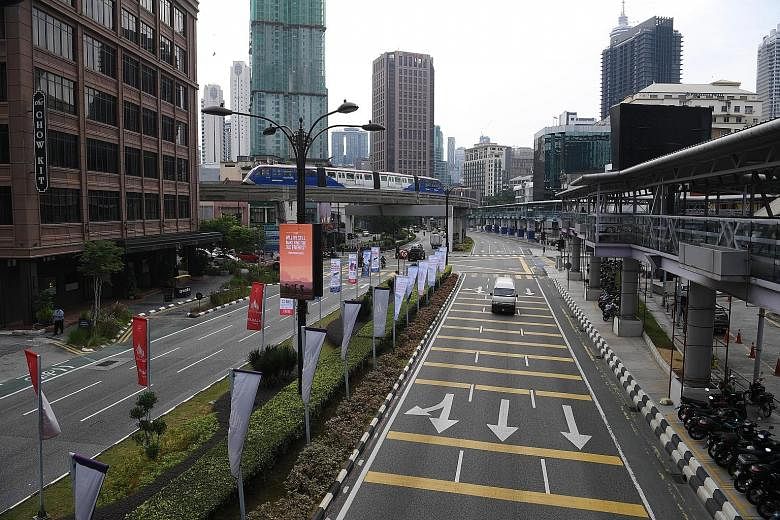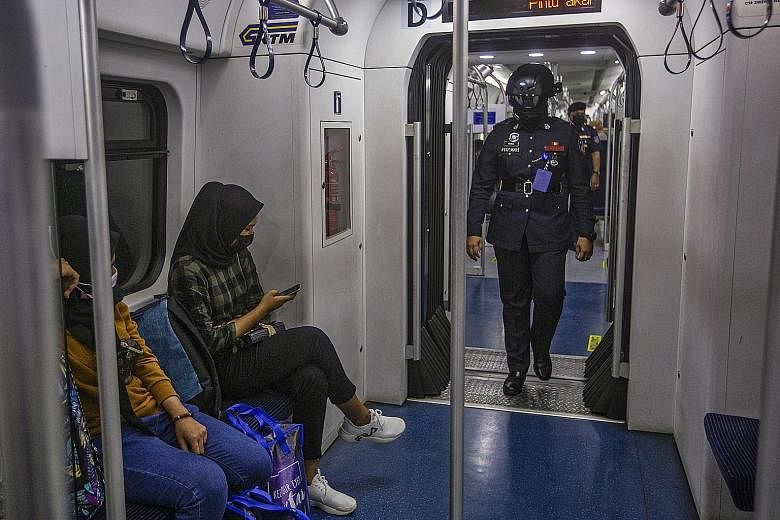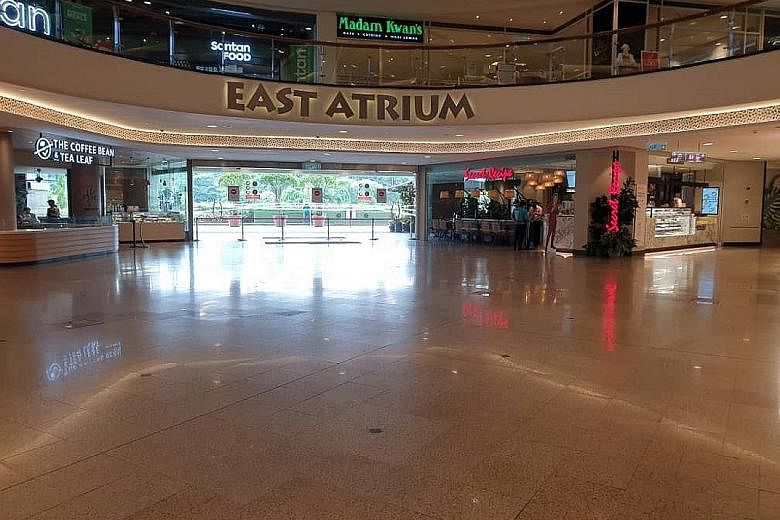KUALA LUMPUR • Malaysia yesterday logged 660 new coronavirus cases, the same number for the second day, as the government reimposed tighter movement curbs on 7.6 million people in Kuala Lumpur and the neighbouring state of Selangor for the next two weeks.
They joined another 3.5 million residents of Sabah state which saw the reimposition of the conditional movement control order (CMCO) on Tuesday.
The tighter restrictions were reimposed as new daily cases of Covid-19, that had trended down in the last few months to two digits, started to rise again from late last month.
Malaysia has seen over 300 cases a day in the last 10 days, from Monday last week.
New daily cases hit a record high of 691 last Tuesday.
The so-called third wave in Malaysia started in Sabah with an outbreak of the disease at detention centres for illegal migrants, and spread quickly following a two-week election campaign that preceded the Sept 26 state polls.
The stricter CMCO in the Klang Valley - as the federal territories of Kuala Lumpur and Putrajaya, and Selangor state are called - replaced the more relaxed recovery MCO that started on June 10.
Under the recovery MCO, mass weddings and mass worship were allowed, while malls and restaurants operated as usual, as long as they adopted safety procedures such as checking the temperatures of workers and visitors.
Mass gatherings are now banned for the next two weeks.
Malls and restaurants, which had started to fill up again in the last four months, remained open but many were empty yesterday, as customers stayed away.
Police yesterday started to mount roadblocks again all over the Klang Valley to discourage people from leaving their homes.
Drivers could be stuck for hours in traffic jams as the police stopped vehicles to ask the occupants where they were going.
-
Control curbs at a glance
-
Malaysia's latest conditional movement control order covers Selangor state, including Kuala Lumpur and Putrajaya, and Sabah. It started yesterday and runs till Oct 27. Here are the key regulations:
TRAVEL
People are generally not allowed to travel between districts or states. Those travelling between districts for work must show a valid work pass.
A maximum of two persons from each household are allowed to go out to buy necessities.
Prior police approval is needed for inter-district or inter-state travel for emergencies or funerals, and for flights.
BUSINESS
Most businesses are allowed to operate. Restaurants, convenience stores and markets remain open, subject to standard safety procedures. People can eat in at restaurants, but are limited to two diners per table.
SCHOOLS
All educational institutions, including schools, kindergartens and colleges, will be shut.
PUBLIC TRANSPORT
All public transport to continue to run as usual.
E-hailing vehicles and taxis are limited to two passengers at any time.
PLACES OF WORSHIP
Only six people are allowed in a mosque or non-Muslim place of worship at any given time.
SOCIAL ACTIVITIES
Most recreational, social and cultural activities are not allowed. These include weddings, exercising in public parks or visiting entertainment outlets.
Pubs and nightclubs, theme parks, recreational centres, indoor playgrounds and movie theatres are not allowed to operate.
Some non-contact sports, however, are allowed but limited to 10 people.
For those crossing state borders to work, they need to show letters from their employers.
Deputy Inspector-General of Police Acryl Sani Abdullah Sani said: "We are focusing on the borders of districts and states in Kuala Lumpur, Putrajaya and Selangor. We have started since midnight on Wednesday."
He added: "The government's aim at limiting the movement of people has been achieved.
"However, we are still monitoring the situation."
The government, worried that shutting down commercial activities could kill the already weakened economy, is allowing most businesses to continue to operate.
Senior Minister Ismail Sabri Yaakob gave his assurance that activities in the economic, business and industrial sectors are able to continue as usual despite the curbs.
"Individuals who are in the high-risk category, as well as children, are encouraged not to be in public, open and crowded places during this period," he said.
While food outlets are encouraged to provide takeaways, deliveries and drive-through services, dine-in is still allowed but limited to two people per table.
Clinics and hospitals can still provide 24-hour service, while operating hours for pharmacies are between 8am and 11pm.
Meanwhile, many operators of eateries are concerned about a slide in business again, first seen when Malaysia imposed the strict MCO in mid-March and eased the restrictions only in June.
Subang Jaya Coffee Shops and Restaurants Association chairman Johnny Liu said this is going to be a tough period for the more than 3,000 coffee shop and restaurant owners in the Subang Jaya and Seri Kembangan areas in Selangor.
"We had just started to recover since the implementation of the MCO in March.
"Our members are also requesting for help to cover their rental and utilities bills," he said.
Mr Chua Beng Chun, who owns a cafe in Klang on the Malaysian west coast, said he and his staff had rushed to prepare new takeaway and delivery menus.
"I think it is extra tough on cafe owners because most customers who dine in do so for the ambience and environment," he said.
Datuk Seri Ismail Sabri said that although the CMCO is strict in the Klang Valley, stricter measures are being imposed in Sabah, where the bulk of daily cases are recorded.
"For Sabah, it is stricter because almost half of the state is in the red zone (showing a spike in cases), while for Selangor, Kuala Lumpur and Putrajaya, this is a proactive move by the government to prevent further infections.
"We are seeing an upward trend in cases and we are concerned whether it would infect other districts or areas, and that's why we have the conditional MCO in place," he said.
The numbers showed that most cases in recent weeks were from Sabah.
Of the 660 cases logged yesterday, 429 infections - or 65 per cent - were from Sabah.
The Health Ministry's director-general Noor Hisham Abdullah said: "This is due to the increased Covid-19 screening activities which are being carried out in the state, and with more samples producing results."
Kedah state had 113 cases, with the recent jump in cases from a big outbreak in Alor Setar Prison, followed by the spread of infections in two other state prisons.
Klang Valley yesterday recorded 11.5 per cent of the 660 cases.
Selangor had 68 cases, Kuala Lumpur had seven cases and Putrajaya had one case.
THE STAR/ASIA NEWS NETWORK



